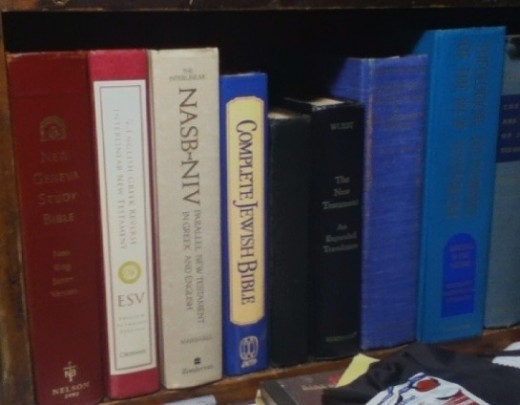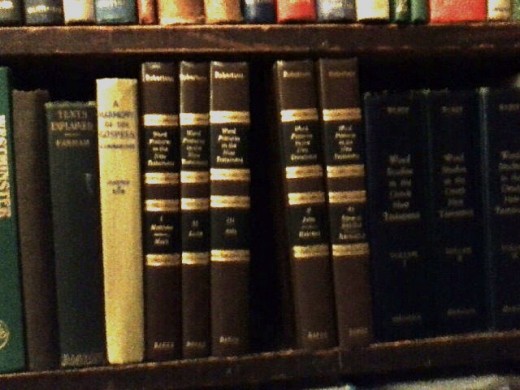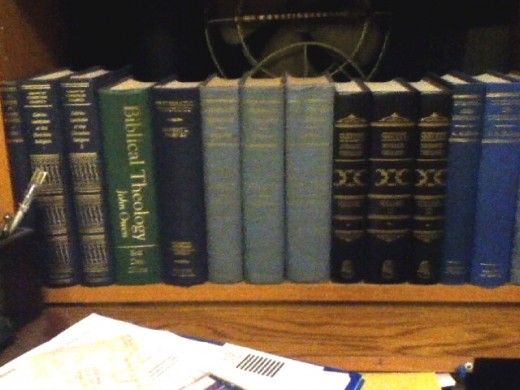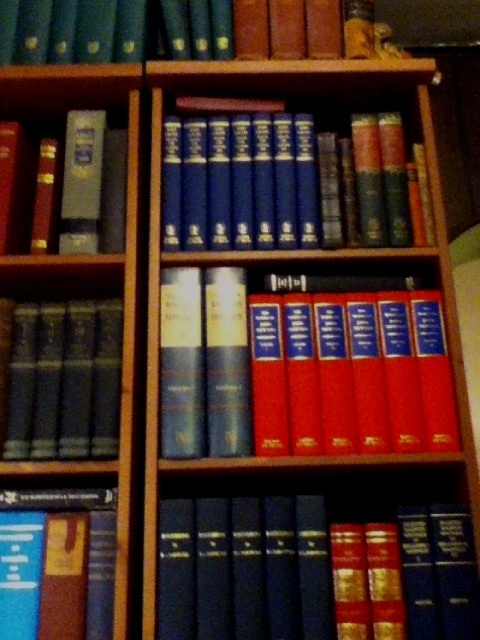The Christian & Private Study - The Christian Library

I've continually run into Christians who seem to have a disdain for theology, in general. I don't mean that they hold some specific theological view in contempt or that they discount in particular the usefulness of published systematic theologies - I mean they reject the basic idea of scholarship, they turn away from the research and well studied aid a solid Christian library can provide. Their argument is frequently this simple and direct - "I just study the Bible", suggesting, and often saying, that they don't need or want other men's opinions - just the Bible.
Now, when I first became a Christian, in my mid/late teens, I read nothing but the Bible for about a year or so, and I've always counted that to have been, for me, a very beneficial course. I came to understand what I believed and why I believed it. But I then began to read church history, because I wanted to understand who all these other Christians around were, I wanted to know who Methodist and Presbyterians were and how they came to be, what Baptists and Lutherans believed and why they believed differently, etc. Then I began to research and study theology, then the original languages, etc - I saw myself, in this endeavor, as the fellow standing in the back of the elephant . . . I see a tail, legs, and other things, but I was interested to walk around the side and to the other end, and I wanted to talk to those looking at this elephant from perspectives other than my own.

This approach of seeking the perspective, insight, and understanding of others is sound in all aspects of life, but I think especially so concerning spiritual things, eternal truths. The argument is then regularly reengaged along the lines of "But I rely on the Holy Spirit - God has given us His own Spirit to teach us His word, why do I then need to heed the teachings of men?". But, you said God has given "us" the Holy Spirit . . . if I were the only recipient of this great gift, if I alone were filled with the Spirit of God, then I would be most foolish to seek the counsel of men - but if God has given His own Spirit to others, to men with far keener minds and far more learned than me, I would be most foolish to discount their perspective, their insight, their understanding.
I know C.S. Lewis once said "My own eyes are not enough for me, I will see through the eyes of others. Reality, even seen through the eyes of many, is not enough" but it seems to me I recall Robert Murray McCheyne saying something very much like "Mine own eyes are not sufficient for me to see God - I would see Him through the eyes of all His children or I would in truth see very little of Him". Perhaps what drew me to the works of other men, and perhaps why so many seem willing to disregard the works of other men, is an appreciation of history.
If we own some understanding of the course God's people have followed, if we understand how ideas are come to and either developed or rejected, then I think we more readily recognize the great value of hearing what Christians, not swayed by the same era and culture that we are part of, perceive the Bible to present as the truth. I understand it may be a bit intimidating to some, but I want to know what a 5th century North African Christian counted Paul to be advancing as truth in his letter to the church at Ephesus, I want to know who a 16th century Frenchman counted Jesus to be when he read Luke's gospel, I want to know what a colonial American preacher counted as the gospel message when he read Romans, etc.
If all we ever consider and ruminate over is what we already think, or what Rick Warren or Joyce Meyer and others of our own era and culture think, then we may well be in Jesus' church, but we are down at the end of a hallway shut-up in a tiny closet - there is so much more to delight in and benefit from than our own tiny closet. There are brilliant and devout men who know the original languages, who know the historic development of theology, who know the history and culture of the times the Scripture was written, etc. What I am providing below is kind of my desert island library - these are various study tools and aids, most of them have long been counted as standard works on the text and teaching of the Bible by a broad scope of orthodox Bible-believing Christians . . . and I have included some particular favorites of my own as well.

The Actual Text Of Scripture - Bible Versions
The very first step, of course, is to use an accurate translation from the original languages. I'm not going to introduce debate here on what should rightly be regarded as the legitimate 'received' received text, but I will very briefly touch on the philosophy of translating. Speaking specifically of English versions, essentially there are two courses those translating Scripture can take; our versions of the Bible are either a thought-for-though or a word-for-word Bible. Let me describe the distinction here; say you are translating the Bible into the language of some Amazon tribe and the original Greek text reads "You sins will be as white as snow", however, this amazon jungle tribe has no idea what snow is . . . do you carry over the idea of how white snow is and translate "as white as the sand" or do you carry over the precise terms used in the text, translate "white as snow" and then tell them what snow is?
Versions like The Message, Good News, The Living Bible, Contemporary English Version, and the very popular NIV are thought-for-though versions - they attempt to make the Bible easy for today's reader to understand (and are frequently aimed at a grade school reading level). The trouble is, this is God's word, and how do we know if we alter the text to make it easier to understand we're not altering some of the meaning? God said "white as snow" not "white as sand" and while we may think 'what's the difference?' there are obvious differences . . . we may not instantly see the significance, but, snow falls from the sky, it is cold, it melts, it lasts longer at higher elevations, up very close each particle is unique and beautiful, etc, etc - you lose all that when you change "snow" to "sand" and I, personally, don't trust our rendition over God's, I want to know what God said, not what other men assume He meant.
On the word-for-word side we have the King James Version, The New American Standard Bible, and the (relatively) new English Standard Version. The NASB has long been held to be the most accurate English translation, but some feel in it's design to be accurate it's form is a bit clunky, some say it's sentence structure doesn't read smoothly for today's English reader. The ESV, I think, is the best English translation available. It is as easy to read as the NIV yet it is accurate as the NASB. And if you're familiar with the KJV you just about always know where you are . . . I've been at Bible studies where someone was reading from The Amplified or NIV, etc, and I can barely follow along - with the ESV you're almost always in familiar territory.
Also, there is a difference between reading and studying the Bible, the ESV is excellent for both. You can sit and read Genesis or Galatians and move from page to page following the intent of the author, pursuing the outcome of a story or the reasoning behind an idea, etc - you can also sit with Greek aids, maps, a concordance, histories and commentaries, etc, and do serious study. A very useful tool to serious study is an interlinear Bible. This presents the original Greek text with an English subscript, so that under the corresponding Greek word would be the Anglicized form and our English equivalent . . . depending on the edition, sometimes grammatical information is included (verb, noun, tense, etc). Typically, say the word 'deacon', this would appear something like this (among the text) on the page:
διακονοις
diakonois
minister
. . . the first word being the actual Greek, under it it's Anglicized form, and under that the English equivalent. The editors of the ESV, in an effort to both provide a useful study aid and to demonstrate how accurate there translation is, have published what they call a 'reverse interlinear' NT. This is their ESV version of the English translation with each corresponding Greek word subscripted under it. This is a great tool that cuts out several steps when doing studies on the original Greek text - I will explain this in the next section, on language tools.
There are also aids like 'A Harmony Of The Gospels' which will show 4 columns each presenting their (Matt, MK, Lk, Jn) account of some portion of the gospel, and parallel editions which present 2 or more English translations side-by-side . . . so you might have 3 columns on each page, one being the KJV the next the NIV and the next the NASB, each supplying their own rendition of the same portion of Scripture..
Finally, there are Study Bibles - Bibles with study notes and aids included amidst the text of Scripture . . . The Scofield Reference Bible, Ryrie, Charles Stanley, Falwell, etc, etc. Personally, I'm not too keen on these, I prefer a reliable text and a small collection of reference works like I list below - but if can't readily have even a single shelf of study aids, then I understand the value of a good study Bible. The only two I would recommend, and I think they are both exceptional helps, are The Reformation Study Bible (formerly The Geneva Study Bible) and the ESV Study Bible. You can get The Reformation Study Bible in the ESV translation as well, the ESV Study Bible is so-called as it's put out by the publishers of the ESV translation. Both provide very good, very sound, helps.

Language Tools
We have several very accurate English translations of the Bible, a knowledge of Greek & Hebrew is not necessary to rightly understand the text a Scripture - but there are times when a reference to the original language can not only provide a deeper, richer understanding, but can actually correct what a simple reading of the English might mislead us to conclude. Researching the Greek we may find that the call of 'great commission' to "go" and make disciples might more accurately be a call of 'as you are going (as in, going about the routine of your life) always be making disciples' (also, the benefit of referencing the original languages can be seen when you consider that there are at least 30 different Greek words that are all translated "go" in our English Bibles). Likewise, consider that the familiar passage where Jesus asks Peter three times "do you love Me?" and commands him three times to "feed My sheep", might more accurately be rendered 'do you love Me - do you adore Me - do you worship Me?' and 'feed My sheep - give food to My lambs - nourish My pet lambkins'.
The Bible was originally written in ancient, now dead, languages and centuries later translated into our own language - some investigation into the the original text of Scripture can certainly be profitable in gaining a better understanding of the truth God reveals to us in His word. Several standard works that aid us in that investigation include;
Strong's Exhaustive Concordance
I include Strong's here both because it is so commonly used by many as a dictionary of Greek meanings, and because so many other Greek language aids are indexed to the numbering system established in this work - however, I quickly assert that Strong's is best used as a concordance and not as the final or best source for Greek word studies. Many Bibles provide a limited concordance in the back of the book . . . if you're reading Paul's letter to the church at Philippi and you see that he addressed it to the believers, elders, and deacons, you can go to the concordance and look-up 'deacon' and see other places where the Bible talks about deacons.
The concordance in your Bible will refer you to some other passages that have the word 'deacon' in them - what is 'exhaustive' about Strong's concordance is that it will list every appearance of the word 'deacon' in the Bible. There are other concordances, namely Cruden's & Young's Analytical Concordances, but because Strong's lists every word in the Bible and because it's numbering system is so widely incorporated into other works, if you're going to have one concordance, Strong's is your best choice. However, as I mentioned above, it is best used as a concordance and not as the definitive word on the Greek text and it's meaning (Young's Analytical Concordance is actually superior for that), for that, the following tools are recommended.
Vine's Expository Dictionary Of New Testament Words
This work is a dictionary of English words that appear in the Bible and the Greek words they are translated from, with definitions. Under the heading of 'minister' will appear the several different Greek words that are all translated 'minister' one place or another in Scripture, where they can be found, and their definition. So, under 'minister' Vine's will tell you the Greek word sometimes translated 'servant' is translated 'minister' in 'this' or 'that' passage in whatever gospel or letter, etc, another Greek word sometimes translated 'slave' is translated 'minister' in 'this' or 'that' passage in whatever gospel or letter, etc, and still another Greek word sometimes translated 'deacon' is translated 'minister' in 'this' or 'that' passage in whatever gospel or letter, etc,, etc, etc. Vine's supplies both the contextual indication on meaning and a fuller definition than Strong's.
A.T. Robertson's Word Pictures in The New Testament
This (6 vol) work follows the oder of the books of the Bible text we are familiar with, pausing at each verse where attention to the original Greek provides insight. So, coming to Paul's letter to the church at Philippi, addressed to deacons, Robertson might reference that deacons were one of two ordained officers in the NT church, direct us to the origin of the office in Acts, and provide etymology (origin, root, developmental meaning) and insight for the Greek term translated here as, "deacon".
Wuest's Word Studies In The Greek New Testament
This is a 4 volume set that includes and expanded translation of the NT (incorporating verb tenses and fuller word meanings into the translated text), more extensive verse-by-verse information for some books concerning the Greek text, and a collection of essays using the Greek to more fully explain such NT phrases as "falling away" and "the eye of the needle", more extensive vocabulary definitions on terms like "baptism" and "foreknowledge", etc.
The Brown, Driver, Briggs Hebrew & English Lexicon
This provides fuller definitions of OT words, coded to Strong's . . . so, reading Genesis, you can look-up 'created' in Strong's and see the index number attached to it, then look-up that number in Brown, Driver, Briggs for an expanded definition of the Hebrew.

Commentaries
Commentaries are a departure from everything we've looked at so far as, rather than an aid to discovering the meaning of the text of Scripture, they offer an interpretation of the meaning of the Bible from one man's, or a team of men's, perspective and understanding. As long as it's remembered that a commentary is what someone thinks the Bible is saying, and is not, like the Bible itself, authoritative truth, they can be very helpful. There are commentaries on the whole Bible and commentaries on specific books of the Bible, one volume commentaries and multi-volume commentaries.
As I said earlier, I prefer commentaries from men unlike myself, men of another age and culture - I know what someone living in the same age as I am, someone under the same cultural influences as I am, might find when he looks to the Bible . . . I want a perspective other than my own. I also have some confidence that time has, somewhat, weeded-out the trivial and the erroneous and that those commentaries that are still referenced, still sought after, still convicting and encouraging God's people, are more likely to be commentaries that convey genuine spiritual truth. And so, again, I favor what have become standard works, appreciated by Lutherans & Baptists, Methodists & Presbyterians, etc.
Jamieson, Fausset, & Brown
This, I believe, is the best single volume commentary on the whole Bible available. It is very orthodox, very solid & sound, and often provides surprisingly rich insight for so massive an endeavor.
Matthew Henry
This work has long been counted to be the 'gold standard' for Bible commentaries. Usually published in a 6 (sometimes 4) volume set, but also appearing as an abridged single volume, reading Matthew Henry is like a course in theology, a profound sermon, and visiting with your most spiritually mature and gifted friend.
Calvin's Commentaires
Setting any debate about the merits or harm of 'Calvinism' aside, it is very commonly agreed that John Calvin not only excelled as a commentator, but that he invented commentating as we know. What is surprising to many is his warm, pastoral manner - he was a brilliant man (some reasonably assert the greatest mind of all time) and profound theologian, but as a pastor he was strikingly intimate about his Christianity, much of his attention is given to how we ought to love God and live our lives in His service. His commentaries (on individual books of the Bible) are not the dry, endless theological treatises you might imagine - he is warm, and direct and to the point.
Charles Hodge
Hodge was the principle of Princeton Theological Seminary in the late 1800s (when Princeton was the American seat of Biblical Christianity). He didn't author a commentary on the whole Bible or even most of the Bible, but his commentaries on several Paul's' NT letters provide very sound Biblical teaching.
Handley C.G. Moule
Again, warm, pastoral, and sound Bible teaching.
Various
Of those a bit more heavy-duty, or technical in spots, but very sound and useful, I would include Godet, Lightfoot, Eadie, Alexander, John Brown, John Owen, etc.

Theology
A great variety of material can be considered under the banner of theology. There are single books on, say, the atonement or the deity of Jesus, there are works that cover a certain theme like salvation and so deal with conviction, faith, justification, etc, and there are multi-volume sets of systematic theology . . . we will give our attention first to systematic theologies.
The 'systematic' in systematic theology references the intent to present a well ordered review of the whole of revealed truth, how the distinct ideas of God and man and redemption, etc, all fit together as a unified idea of the truth. A work on systematic theology will typically start with the idea of the Bible (it's inspiration & inerrancy, etc), because for the Christian all ideas about eternal truth (God, sin, salvation, etc) to follow come from our understanding of what the Bible presents to be the truth. Then, typically, the idea of God, creation, man, etc. Under the the section on God ideas like the Trinity, creation, foreknowledge, etc, are presented. A section on Jesus would include His deity, the incarnation, etc. Then attention would be given to man, our nature and our fall & corruption, then salvation would cover the ideas of sin, the atonement, faith, predestination, etc, and so on.
If every Christian should have at least one systematic theology, and I don't think that's a bad idea at all, I would encourage all to get ~
Hodge's Systematic Theology
This is a 3 volume set of exceptional usefulness. Charles Hodge is at once very scholarly, very readable, and even warm and pastor-like from time to time. On many subjects he presents the variety of views commonly held, like say on baptism, he would explain the teaching of those who sprinkle and those who immerse, those who baptize infants & adults and those baptize only adults, those who take baptism as necessary for salvation and those who take it to be a mark or sign of salvation, etc, giving a review have the historic development of the doctrine and the arguments advanced by each group for their position. Hodge is very learned and himself, I believe, presents the orthodox, historic Christian, Biblical understanding of these great ideas . . . and, at about $30 for a 3 vol set, he presents the best systematic theology for the least cost.
'Outlines Of Theology' & 'Evangelical Theology'
Charles Hodge's son, A.A. Hodge, put together these two different single volumes, that present, in a more dissertation-like form, the main subjects of theology (God, sin, redemption, etc) with the same orthodoxy as his father.
'Studies In Theology'
This single volume by Loraine Boettner provides a scholarly but easily readable review of the main ideas of God and salvation.
'A Body Of Divinity'
Thomas Watson's , in this single volume, attends to the same essential ideas . . . but whereas Boettner is much more our contemporary, publishing in the late 1940s, Watson published his works in the mid 1600s and offers us the Puritan view and style.
'The Works Of B.B.Warfield'
This is a reasonably priced 10 vol set of that, while not systematic, covers a great deal of doctrine & theology.
'The Works Of Jonathan Edwards'
Is a rather costly 2 vol set that, likewise, while not systematic, covers a great deal of doctrine & theology . . . these two men (Warfield & Edwards) loom large in the historical development of Christian thinking and how we've come to own the understanding we have today of Biblical doctrine.
'The Institutes Of The Christian Religion'
However, no one looms as large in Christian theology as John Calvin (with a gigantic nod to Augustine). You can't say the name 'John Calvin' without people recoiling with repulsion and disdain for whatever their understanding, or impression, of 'Calvinism' is, but the simple fact is, much of what modern evangelical American Christianity holds to be the truth about the infallibility of the Bible, the deity of Jesus, His bodily resurrection, the sufficiency of the atonement, salvation through faith alone, the immanent return of Jesus, etc, etc, all comes from John Calvin's articulation of these great Bible truths. Calvin's 'Institutes Of The Christian Religion' is still to this day required reading in many seminaries and theological courses, it remains the foundational starting point of our historic Protestant understanding of what the Bible presents as the truth.

Various Study Aids
Maps, a good encyclopedia/dictionary of Christianity, and books specifically on the temple or the names of God, etc, can all be very helpful. I will list, without much elaboration, some standard study tools ~
Strong's Exhaustive Concordance
Strong's was mentioned above, in the Language aids section, but I mention again here as it is best used as a concordance. For instance; if you're reading Philippians and see that Paul addresses this letter to deacons, you can then use Strong's Concordance to look-up every place in the Bible where the word 'deacon' appears.
Nave's Topical Bible
Provides scripture texts ordered under subject - so, under 'baptism' or 'prayer', etc, would be passages that reference those ideas.
Edersheim's The Life And Times Of Jesus The Messiah
& Connybeare & Howson's Life and Epistles Of saint Paul
Both of these works provide an orderly account of the life and ministries of Jesus & Paul, respectively, with insights into the customs, cultural, and history in which they lived and worked. Alfred Edersheim also wrote specific books on ~
The Temple and Its Ministry and Services at the Time of Jesus Christ
Sketches of Jewish Social Life in the Days of Christ
History of the Jewish Nation after the Destruction of Jerusalem
Bible History
John Kitto, William Blaikie, and F. W. Farrar all produced single volume accounts of the Bible's presentation of man's historic course.
Church History
The name Philip Schaff is just about synonymous with church history. He wrote and or edited works on ~
History of the Christian Church
From The Apostolic Era to The Reformation
Creeds of Christendom
The Ante-Nicene Fathers
"Nicene" referencing The Council of Nicaea and "ante" meaning before, so these are English translations of the early Christian writers . . . Clement, Ignatius, Polycarp, Tertullian, etc.
The Nicene Fathers and Post-Nicene Fathers
These are English translations of the Christian writers from Athanasius through Jerome, Ambrose, Augustine, etc.
G.Campbell Morgan
I don't know that I count books more encouraging and genuinely helpful to me when I first began to study the Bible than G.Campbell Morgan's books. Rather than simply telling you what he thinks about the text, Morgan demonstrates how you can discern the meaning yourself. reading Morgan you learn that you can compare Scripture with Scripture, consider the context, investigate the original languages a bit and look-up the history and culture, etc, and that anyone can gain a deeper understanding of what the Bible is saying than by merely hearing or reading it. His books provide an overview, they outline a course, they set the stage for you to discover for yourself what you understand the Bible to be presenting as the truth. I don't think I've ever read, or currently ever read, G.Campbell Morgan that I don't leave the book having learned something I didn't already know or having a perception to consider that I never quite saw before. Some of his works include ~
The Crises of the Christ
The Teaching of Christ
The Ten Commandments
The Parables and Metaphors of Our Lord
Living Messages of the Books of the Bible
The Analyzed Bible
The Unfolding Message of the Bible
Suggested Favorites
All of the above works are widely regarded as standards, some even classics, on the material they cover . . . I use them and gladly promote the benefits of their use, but beyond my own opinion, they are commonly counted to be essential tools in the Christian library. What I suggest now are some of my own personal favorites, while also considered classics, they might not rightly be advanced as 'essential' - but it is definitely to your own best interest to read ~
The Letters Of John Newton
There is nothing I've ever read, apart form Scripture itself, that is so significant, convicting, and encouraging, as Newton's letters. This is John Newton who most know as the author of the renowned hymn 'Amazing Grace', but he was far more than merely the author of that great hymn. His personal letters are a storehouse of theology, application, preaching, exposition, etc, etc. And there's no author I more enjoy simply reading, were I to disagree with his content I would still delight to read his prose - however, there's no one I've every come across that I recognize myself to agree with more. If you read John Newton, you will know sound theology, solid doctrine, accurate exposition of Scripture, and you will come to know yourself in a profound manner.
The Memoirs and Remains of Robert Murray McCheyne
Early in my Christian life, as I read great works by great men, I kept seeing the name 'Robert Murray McCheyne' . . . again and again I would see his named referenced as (one author put it) "the greatest example of the work of the Holy Spirit I have ever seen". Remarkable men, giants in the history of Jesus' church, would repeatedly mark McCheyne as the most spiritually mature, gifted, and impressive man they'd come across. After reading a brief biographical sketch and then excerpts from his journal, it was easy for me to agree - the humility and personal conviction that shaped this man is a marvel to behold.
The Screwtape Letters
'Coming to know yourself in a profound manner' cannot be said more truly of any other book than C.S.Lewis' 'The Screwtape Letters'. This is a pretended collection of letters of advice from a senior demon to a novice demon on how best to hinder men from knowing the truth and enjoying fellowship with God. The insight Lewis demonstrates into human nature is stunning. As you read of our miserable condition you think 'I know just the kind of people he's talking about', as you continue on you begin to think 'even I struggle with this from time to time', and before you reach the end of the chapter you are humbled into 'how can he know me so well?'.
Mere Christianity
C.S.Lewis' popular modern apologetic presents a well-reasoned defense of the validity of the Christian ideas on God and sin and redemption, etc. Written in a conversational manner, it is easy to read yet Lewis does not shy away from profound ideas.
How Then Shall We Live
This work by Francis Schaeffer is a good introduction to the idea of how we each own a world-view that shapes how we perceive the things around us - our culture, politics, religion, etc. We may not have ever sat down and deliberated over what our general world-view might be and how it influences our thinking, but but each of us has a collection of knowledge and experiences and have ideas presented to us and withheld from us in such a manner that we stand a certain ground, we have a kind of starting-point that colors all that confronts us and influences how things appear to us. This book is a quick historic sweep of how culture develops, how art and even architecture flavor our impressions and sway how we think.
Final Thoughts
As a final word of encouragement, I will challenge you not to be intimated . . . this is a long list of books, and some of them may seem a bit weighty and presenting unfamiliar material, but do not feel overwhelmed. I started picking-up what looked like it might be an interesting and useful book here and there 40 years ago. Through the years I've had several different book hunting friends that I've traveled to used book shops, auctions, private sellers, etc. Some of my fondest memories are afternoons with a good pal hunting through an old book shop, stopping for lunch, and coming home with a cool new book to scan through.
Today I have a library that is both very helpful and filled with great memories. And here's the thing; while everyone is not equally academically inclined, some folks can sit and keep themselves entertained for hours and some need to get out and do things, etc, the fact is I not only hate to read but I'm a high school dropout. Reading is a chore for me, my eyes are such that I don't read for entertainment but I only read to find out something I want to know . . . and I stopped doing any school work in 7th grade and virtually stopped attending classes in 10th grade. I encourage Christians to seek-out the benefit a good Bible study library affords both because it has aided me in my own Christian growth and because, frankly, if I can do it anyone can do it.
In the next installment of this series, I will talk a bit about life experiences and how God is training us, not only through preaching and study, but by having the kids running around us in circles while we're trying to get the dishes washed . . . the Holy Spirit is trying to get through to us just about every moment of every day but the business of life and our own selfish interests blind us to some much heavenly instruction.
Preface. "Regular, Normal Christianity ~ The Premise And Definitions"
1. Regular, Normal Christianity ~ "The Bible"
2. Regular, Normal Christianity ~ "God"
3. Regular, Normal Christianity ~"Jesus of Nazareth"
4. Regular, Normal Christianity ~ "The Trinity"
5. Regular, Normal Christianity ~ "Man, Sin, And Spiritual Death"
6. Regular, Normal Christianity ~ "The Covenant, The Promise, The Covenants, And The Gospel"
7. Regular, Normal Christianity ~ "The Atonement - Law & Grace"
The Christian & Private Study - A 'How To' Guide
-
'How To Study The Bible'
-
'The Christian Library'
-
'Christian Life Lessons'
"Is Believing In God A Ridiculous Thing?"
"The Most Married Man In America"
please share your comments below ~













